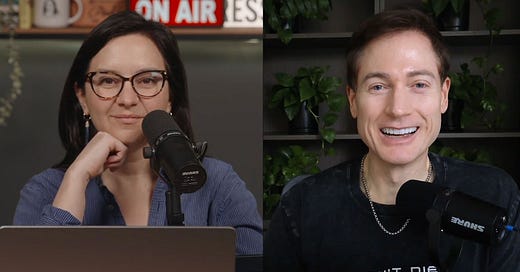If you haven’t heard of Bryan Johnson or watched the new Netflix documentary about him, Don’t Die: The Man Who Wants to Live Forever, Bryan is a person who has given his life—and his body—over to the science of longevity. That means that he has essentially turned himself into a human lab rat, undergoing hundreds of tests and studies on every human marker imaginable in order to discover the best ways to stop the process of human aging.
What he’s found is unconventional to say the least: He eats dinner at 11 a.m., he has swapped blood with his 17-year-old son, and he measures his nighttime erection lengths—just to name a few of the hundreds of things that you probably have never heard of a person doing in the name of health and longevity.
But it’s not just that Bryan wants to reverse aging and live forever. He also thinks we’re at the bleeding edge of a new kind of reality. He believes he’s akin to Amelia Earhart or Ernest Shackleton, and that he’s on the frontier of something big—something that will change everything about humanity as we know it.
In that way, this conversation is not just about wacky exercise routines and unusual supplements. It’s a philosophical discussion about the meaning and purpose of life, and what we’re all doing here on this planet.
Listen to the podcast here, watch the video, or scroll below for an edited transcript.
On how Bryan Johnson structures his entire life around not dying:
BARI WEISS: Why are you trying so hard not to die?
BRYAN JOHNSON: Don’t Die is actually the oldest and most-played game of human history. If you think about most religions, they’re selling a version of Don’t Die. It’s do these things. Don’t die. In the professional world, it’s achieve accomplishments, so you’re not forgotten. You have kids so you can pass on your lineage. “Don’t die” is the most fundamental of all human desires. What I’m suggesting is right now may be the first time that legitimate Don’t Die is here. Whereas before we’ve had to make up stories, now it’s technically, potentially possible.
What I’ve done as a project is I’ve said: Can I slow down my speed of aging to the greatest extent of any human on the planet? And can I then eliminate all the sources of death? Can I become the most Don’t-Die person in human history?
BW: Let’s establish for people just how differently you live your life in terms of diet, exercise, sleep. How many pills and supplements would you say you take every single day?
BJ: Around 50. These things are meticulously measured in my body, and we determine which things are actually slowing down my speed of aging. So they’re not random. This is on the cutting edge of science and technology of how you actually isolate what is causing death in the body and how you neutralize it.
BW: The way you eat might be the hardest thing for people to fathom. Most people eat three meals a day plus a few snacks. What do you eat? We’re talking at 12:30 Eastern Time, and you’ve already had your dinner, as I understand it.


